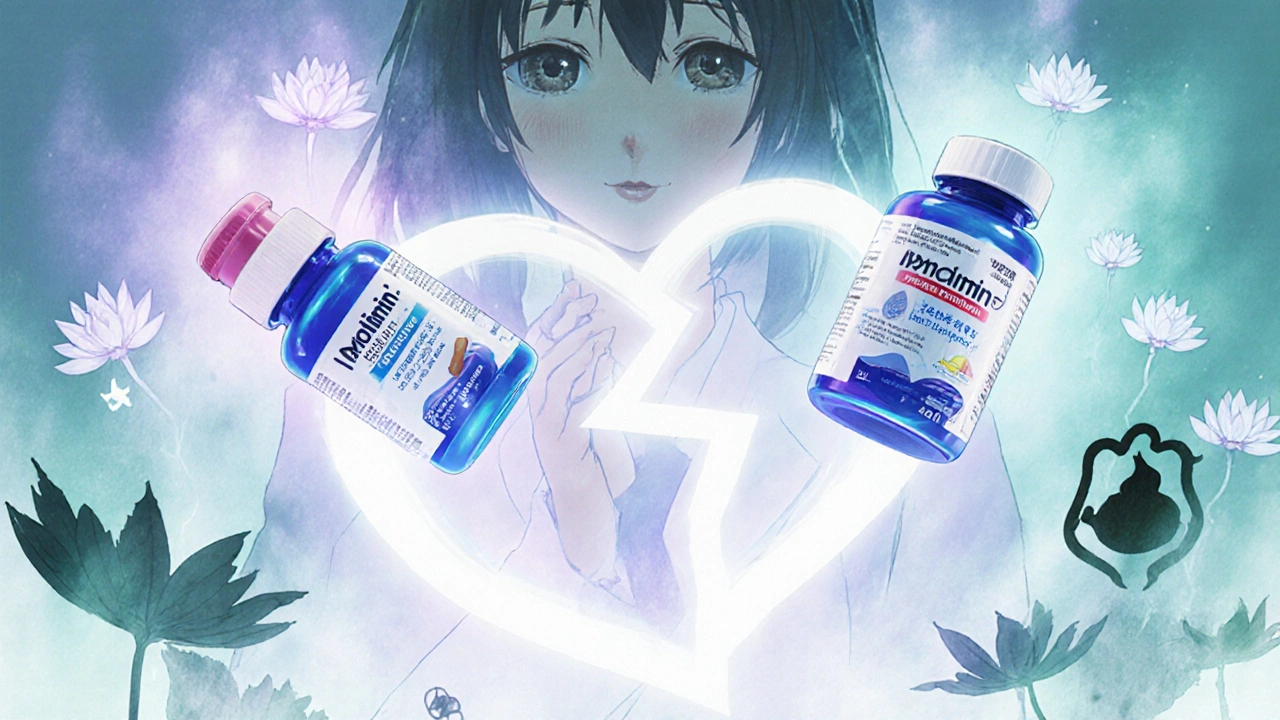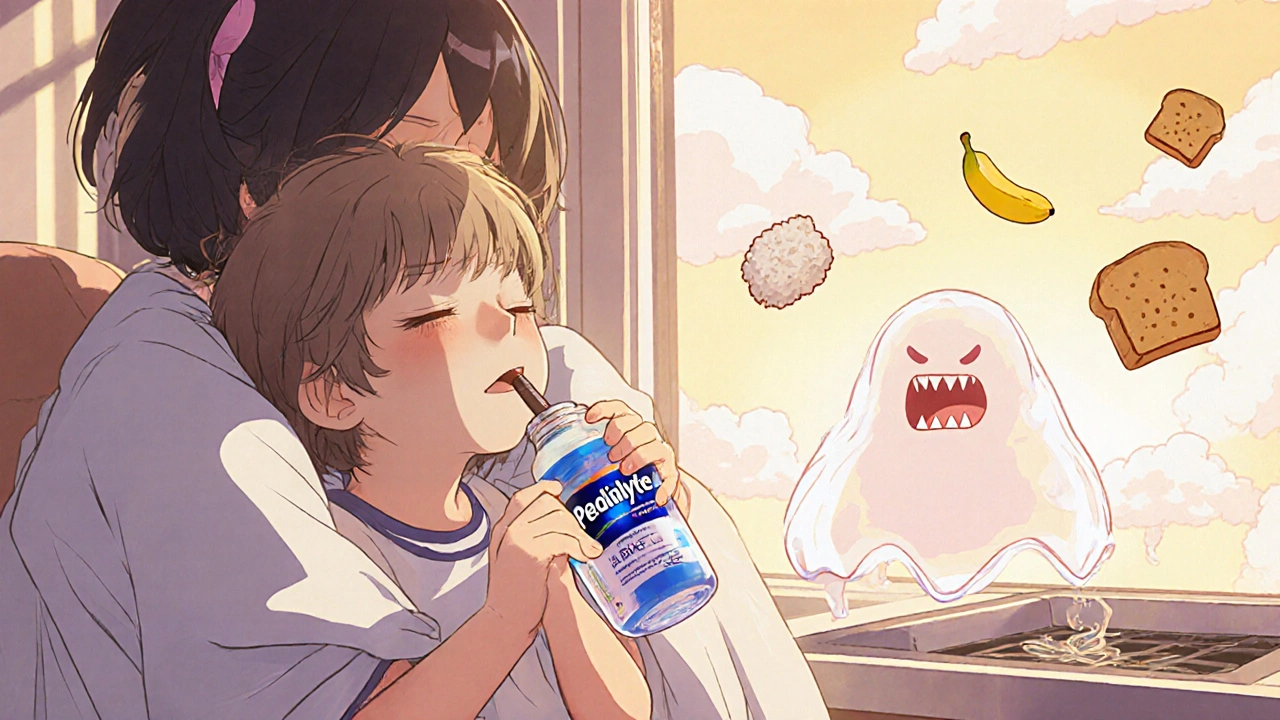Diarrhea is one of those things that hits fast and hits hard. One minute you’re fine, the next you’re racing to the bathroom. It’s uncomfortable, embarrassing, and sometimes scary. But here’s the good news: for most people, it goes away on its own within a couple of days. And for those days in between, OTC diarrhea treatments like Imodium and Pepto-Bismol can give you back some control. But using them wrong can make things worse-sometimes dangerously so.
What OTC Diarrhea Treatments Actually Do
There are two main types of OTC diarrhea meds you’ll find on any pharmacy shelf: loperamide (Imodium) and bismuth subsalicylate (Pepto-Bismol, Kaopectate). They work completely differently, and knowing how helps you pick the right one.
Loperamide slows down your gut. It’s an opioid that acts only in your intestines-doesn’t affect your brain at normal doses. It reduces how often you have bowel movements by 40-60% within 24 hours. It kicks in fast, usually within 30 to 60 minutes. That’s why people reach for it when they’re stuck in a meeting or on a long drive.
Bismuth subsalicylate does more than just slow things down. It coats your gut, soaks up toxins, reduces inflammation, and even kills some of the bacteria that cause diarrhea-like E. coli and Campylobacter. It also helps with nausea and stomach cramps, which loperamide doesn’t touch. If you’ve got the whole package-diarrhea, upset stomach, maybe even a little vomiting-Pepto-Bismol is often the better pick.
How to Use Them Correctly
Both meds come in pills, liquids, and chewables. Dosing matters. Too little? Won’t help. Too much? Could land you in the ER.
For loperamide (Imodium):
- Start with 4 mg after your first loose stool.
- Then take 2 mg after each additional loose stool.
- Don’t go over 8 mg in 24 hours. Ever.
For bismuth subsalicylate (Pepto-Bismol):
- Take 30 mL (2 tablespoons) of liquid or two chewable tablets after each loose stool.
- Max is 8 doses in 24 hours-that’s 2,096 mg of bismuth subsalicylate.
And here’s the big one: stop after 48 hours. If it hasn’t cleared up by then, it’s not just a bug-it might be something else. Keep taking it, and you risk trapping harmful bacteria or viruses in your system.
When These Meds Are a Bad Idea
Not all diarrhea is the same. And some kinds? You should never use OTC meds for them.
If you have any of these signs, don’t reach for Imodium or Pepto-Bismol. Call a doctor instead:
- Bloody or black, tarry stools
- Fever higher than 101.3°F (38.5°C)
- Severe abdominal pain or swelling
- Signs of dehydration-dry mouth, dizziness, little or no urine, sunken eyes
- Diarrhea lasting more than 48 hours
Why? Because these symptoms point to infections like C. diff, salmonella, or inflammatory bowel disease. Slowing your gut down with loperamide can trap the bad bugs inside. That’s how toxic megacolon happens-a life-threatening condition where your colon swells and can rupture.
And here’s something most people don’t know: loperamide abuse is real. Some people take 50, 60, even 100 mg a day to manage opioid withdrawal symptoms. That’s not just dangerous-it’s deadly. The FDA has documented at least 48 deaths linked to loperamide overdose between 1976 and 2015. Heart rhythm problems, cardiac arrest, sudden death. All from taking too much of a drug you can buy at the corner store.

Who Should Avoid These Meds Entirely
Age matters. Loperamide isn’t approved for kids under 6. For kids 6 to 12, only use the liquid form and only if directed by a doctor. Pepto-Bismol is safe for kids 12 and older, but not younger-salicylate can cause Reye’s syndrome, a rare but serious condition linked to viral infections.
People with liver disease, kidney disease, or heart conditions should talk to a doctor before using either. Loperamide can affect heart rhythm, especially if you’re already on other meds that do the same. Bismuth subsalicylate can interact with blood thinners, gout meds, or diabetes drugs.
And if you’re pregnant? Pepto-Bismol is generally not recommended. Loperamide is considered low risk in pregnancy, but still talk to your provider first.
What to Do Instead of Just Taking Pills
Medications help with symptoms-but they don’t fix the root cause. The real key to getting over diarrhea? Hydration and rest.
Drink fluids with electrolytes. Water alone isn’t enough. Use oral rehydration solutions (like Pedialyte or generic brands) that have the right balance of salt and sugar. WHO guidelines recommend 75 mmol/L sodium-that’s what’s in these solutions. Avoid sugary drinks, caffeine, and alcohol. They make dehydration worse.
When you’re ready to eat, go simple. The BRAT diet-bananas, rice, applesauce, toast-isn’t magic, but it’s gentle. It’s low-fiber, low-fat, and easy to digest. Avoid dairy, spicy food, and greasy meals until you’re fully recovered.
And give your gut time. Diarrhea is your body’s way of flushing out something harmful. Let it do its job. OTC meds just help you get through the worst of it.

What the Experts Say
The American Gastroenterological Association says this clearly: don’t use anti-diarrheals if you have a fever or bloody stools. The Mayo Clinic warns against using them for more than two days. The NHS says loperamide can cause paralytic ileus in kids under 12. Harvard Health reminds us: these drugs can prolong infection by keeping pathogens inside your body.
And here’s the hard truth: emergency rooms see patients every week who took too much loperamide trying to self-treat opioid withdrawal. One doctor in Boston told me he’s hospitalized three patients this year alone for heart rhythm issues caused by loperamide abuse. That’s not a myth. That’s happening right now.
What to Expect After Taking Them
Imodium? You’ll likely feel better quickly. But you might also get constipated. About 12% of users report this. If you haven’t had a bowel movement in two days after stopping, drink more water and eat fiber. Don’t take laxatives unless a doctor says so.
Pepto-Bismol? You’ll notice your stool turns black. Your tongue might too. That’s normal. It’s the bismuth. It’s harmless, even if it looks alarming. It’ll fade once you stop taking it.
Some people swear by these meds. Others say they didn’t help at all. Why? Because not all diarrhea is the same. Viral? Might improve. Bacterial? Might not. Antibiotic-induced? Could get worse. You can’t always tell just by how you feel.
Market Reality and What’s Coming
OTC diarrhea meds are a $1.2 billion industry in the U.S. Imodium owns nearly 60% of the market. Pepto-Bismol holds about a third. But things are changing. New research shows traveler’s diarrhea is becoming harder to treat because more bacteria are resistant to antibiotics. That means people are turning to OTC meds more often.
Still, the future might not be more pills. The FDA just approved a new drug called racecadotril for kids in Europe-it reduces diarrhea duration by a full day. It’s not available here yet. And as at-home stool tests become cheaper and more accurate, people might start testing before they medicate.
For now, though, the rules are simple: use OTC meds for mild, short-term cases. Know the limits. Know the risks. And when in doubt? See a doctor.
Can I take Imodium and Pepto-Bismol together?
No. Don’t combine them. Pepto-Bismol contains salicylate, which is similar to aspirin. Taking it with other medications that affect the gut or heart can increase your risk of side effects like bleeding, kidney issues, or toxicity. Stick to one at a time, and only if your symptoms match its purpose.
Is it safe to use OTC diarrhea meds for kids?
Only under a doctor’s guidance for children under 12. Imodium liquid is approved for kids 6 and older, but only for short-term use. Pepto-Bismol is not recommended for children under 12 because of the risk of Reye’s syndrome, especially if they have a virus like flu or chickenpox. For kids, focus on hydration and electrolyte solutions like Pedialyte.
Why does my stool turn black after taking Pepto-Bismol?
That’s normal. The bismuth in Pepto-Bismol reacts with sulfur in your digestive tract and turns black. It doesn’t mean you’re bleeding or have an infection. Your tongue might turn black too. It’s harmless and goes away within a day or two after you stop taking it. If you’re unsure, check with a doctor-but it’s almost always just the medicine.
How do I know if my diarrhea is serious enough to see a doctor?
See a doctor if you have any of these: fever over 101.3°F, bloody or black stools, severe belly pain, signs of dehydration (dry mouth, dizziness, no urine for 8+ hours), diarrhea lasting more than 48 hours, or if you’ve lost more than 5% of your body weight. These aren’t just "bad cases"-they’re red flags for infections or other conditions that need medical treatment.
Can I use OTC diarrhea meds for traveler’s diarrhea?
Yes, but with caution. Bismuth subsalicylate (Pepto-Bismol) can actually help prevent traveler’s diarrhea if taken before and during travel-it reduces risk by up to 65%. Loperamide is good for quick symptom relief if you get sick. But if you develop fever or bloody stools while traveling, stop the meds and seek medical care. Don’t assume it’s just a bug-it could be something more serious like dysentery.
Is loperamide addictive?
Not in the way opioids like heroin or oxycodone are-at normal doses. But when people take way more than recommended-sometimes over 100 mg a day-to manage opioid withdrawal, it can become physically dangerous. The body can develop tolerance, leading to higher doses and serious heart problems. It’s not addiction in the classic sense, but it’s abuse with life-threatening consequences. Never take more than 8 mg in 24 hours.


Diane Tomaszewski
November 15, 2025 AT 10:49Diarrhea is just your body saying no to bad food or stress. Sometimes the best medicine is just sitting still and drinking water. No pills needed. Let it run its course.
David Rooksby
November 16, 2025 AT 02:55Okay but have you ever stopped to think about how Big Pharma literally *engineered* the idea that diarrhea needs fixing? Loperamide was originally developed as an anti-diarrheal but they quietly discovered it could cross the blood-brain barrier at high doses-and now we’ve got opioid addicts buying it off Amazon like it’s Advil. The FDA knew. They’ve known for decades. They just didn’t want to scare off the $1.2 billion market. You think Pepto-Bismol’s black tongue is weird? Wait till you hear what’s *not* on the label.
Deepak Mishra
November 17, 2025 AT 06:49OMG I took imodium for 3 days last month and my butt just... stopped?? Like literally?? 😱 I was so scared I thought I was dying!! Then I read this and was like WAIT A MINUTE I DIDNT KNOW I COULD DIE FROM THIS?? 😭😭😭 someone save me!!
John Mwalwala
November 18, 2025 AT 11:02From a pharmacokinetic standpoint, the real issue isn’t loperamide per se-it’s the CYP3A4 and P-glycoprotein inhibition cascade that occurs at supratherapeutic doses, leading to QT prolongation and torsades de pointes. The FDA’s 2016 safety alert was understated. Most users don’t realize that loperamide’s oral bioavailability is 30% but its CNS penetration skyrockets when you saturate P-gp transporters. And don’t even get me started on the off-label opioid withdrawal protocols. This isn’t self-medication-it’s a biochemical gamble with your ventricular rhythm.
Rachel Wusowicz
November 18, 2025 AT 21:49They say 'don't use it if you have a fever'... but what if the fever is caused by the medicine itself? What if the whole 'bacterial infection' narrative is just a cover for the real problem-corporate poisoning? I’ve seen it. People get diarrhea after eating 'safe' food... but what if the food was sprayed with a new kind of glyphosate variant that triggers gut inflammation? And then they sell you Imodium to shut it down-so the real toxin stays inside? I’ve got 17 binders in my basement. I’m not taking any pills. I’m drinking activated charcoal with lemon and sea salt. The government doesn’t want you to know this.
Melanie Taylor
November 19, 2025 AT 20:43OMG YES to the black tongue thing!! I thought I was dying 😭 I was like 'is this cancer??' and then my aunt was like 'honey that’s just Pepto' and I cried with relief 🙏 I’ve been using it since I was 12 and now I’m 34 and still trust it with my life 💕
Teresa Smith
November 20, 2025 AT 11:32Let’s not romanticize the BRAT diet. It’s not magic-it’s just bland. The real key is electrolyte balance, hydration, and rest. Your body is not broken. It’s adapting. Medication is a tool, not a solution. And if you’re using loperamide to self-treat withdrawal, you need professional help-not a pharmacy aisle. This isn’t about willpower. It’s about systemic failure. Please reach out. You’re not alone.
Dan Angles
November 22, 2025 AT 04:22While the clinical guidelines presented are generally sound, it is imperative to underscore the importance of differential diagnosis in cases of acute gastroenteritis. The absence of fever or bloody stool does not conclusively rule out invasive pathogens such as Shiga-toxin-producing E. coli or Clostridioides difficile. Moreover, the recommendation to cease OTC therapy after 48 hours should be contextualized within the patient’s comorbidities, age, and epidemiological exposure history. I would encourage all readers to consult with a primary care provider prior to initiating pharmacological intervention, particularly in pediatric, geriatric, or immunocompromised populations.
Ankit Right-hand for this but 2 qty HK 21
November 23, 2025 AT 23:58USA thinks diarrhea is a crisis? In India, we have 300 million people with diarrhea every year and we don’t even have pharmacies. We drink boiled water with salt and sugar. We don’t need your pills. Your medicine is weak. Your body is weak. You are weak. We survive. You take pills. You die. This is why India is stronger than USA. 100 mg loperamide? Ha. In my village, we use neem leaves and cow urine. No hospital. No FDA. Just God. And we live longer.